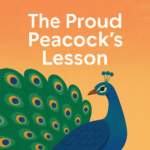In every culture, stories have always held a special place in childhood. Stories for preschoolers are more than just a source of fun and entertainment — they play a crucial role in a child’s learning and emotional development. Whether it’s a timeless fairy tale or a simple story for kids about animals and friendships, storytelling helps shape a child’s language, comprehension, and imagination. In this blog, we’ll explore why retelling stories is such a valuable activity for preschool-aged children and how it benefits their overall growth.
Why is Retelling Stories Important for Preschoolers?
Why Retelling Stories Matters for Preschoolers
Young children learn best through repetition, and retelling stories for preschoolers is a powerful way to reinforce language skills, build memory, and encourage creativity. When kids hear a story multiple times and try to retell it in their own words, they’re practicing essential cognitive skills in a playful, engaging way.
Retelling a story for kids gives them a chance to process what they’ve heard, understand the story structure (beginning, middle, and end), and express it from their own perspective. It strengthens their vocabulary and comprehension, helping them communicate better both at home and in school.
Benefits of Retelling Stories for Preschoolers
Let’s look at the key reasons why retelling stories is important for young children:
1. Improves Language Development
Listening to and retelling stories for preschoolers introduces new words, phrases, and sentence structures. Children practice correctly pronouncing words, using proper grammar, and forming complete sentences when they retell a story.
2. Boosts Memory and Recall Skills
Retelling stories helps kids remember details like character names, events, and settings. This simple exercise strengthens their memory skills, which are essential for academic learning later on.
3. Enhances Comprehension
Children must first comprehend the story before they can retell it for children. This improves their ability to grasp the main idea, sequence events, and identify key points — critical comprehension skills they’ll use throughout their education.
4. Encourages Creative Thinking
Retelling isn’t about repeating a story word-for-word. Preschoolers often add their own twists, characters, or endings. This boosts creativity and nurtures their imagination, which is a valuable part of early childhood development.
5. Builds Confidence and Communication Skills
When children narrate a story for kids in front of others, it helps build their self-esteem and public speaking abilities. They learn how to express ideas clearly and connect with an audience, even if it’s just family members or classmates.
How to Encourage Story Retelling at Home
You don’t need fancy tools or expensive books to encourage stories for preschoolers at home. Here are a few simple ways parents and teachers can make story retelling part of everyday life:
- Read favorite stories repeatedly: Young children love hearing the same stories over and over. This repetition helps them learn the storyline and important phrases.
- Make use of picture books: Preschoolers have an easier time remembering and describing what happened when they read books with clear illustrations.
- Ask open-ended questions: After finishing a story for kids, ask questions like “What happened next?” or “Why do you think the character did that?”
- Act out the stories: Encourage kids to use props, puppets, or simple costumes to retell a story through play.
- Create new endings: Challenge children to come up with different endings or new characters for their favorite stories.
Q&A: Stories for Preschoolers and Story for Kids
Q: What is the importance of retelling stories for preschoolers?
A: Retelling stories for preschoolers improves their language skills, memory, comprehension, and creativity. It also aids in the development of their communication and self-assurance skills.
Q: How often should I read a story for kids?
A: Ideally, read at least one story for kids every day. Repetition helps young children remember storylines, vocabulary, and moral lessons.
Q: Can retelling stories help with my child’s imagination?
A: Yes, of course! When children retell stories for preschoolers and invent their own versions, it stimulates creative thinking and helps develop their storytelling abilities.
Q: Where can I find good stories for preschoolers?
A: You can explore a wonderful collection of engaging and educational stories for preschoolers at Story Times Online, where new and classic story for kids options are available for free.
Conclusion
Retelling stories for preschoolers is a simple, enjoyable activity with powerful benefits. It not only improves language, memory, and comprehension but also fosters imagination and self-confidence. You are giving your child essential tools for academic and personal success by incorporating storytelling into their daily routine. So, grab a book, share a story for kids, and enjoy watching your little one grow through the magic of storytelling.
















Add Comment